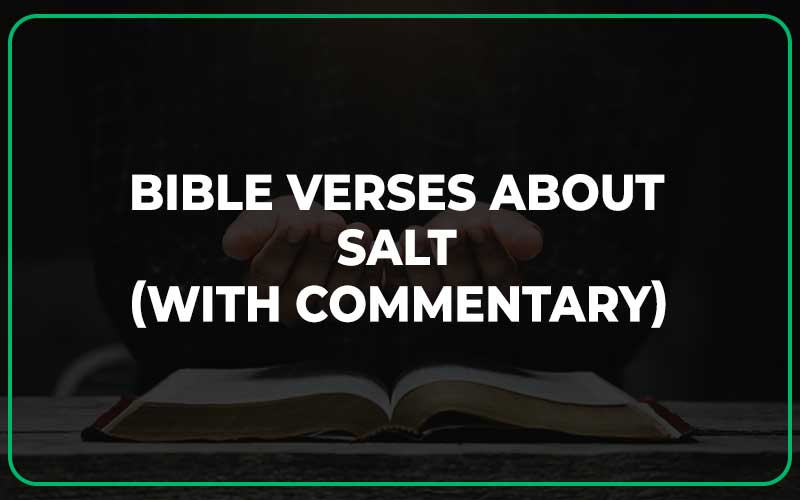In the Bible, salt is often used as a metaphor for various aspects of our faith and relationship with God. From preservation to seasoning, salt plays a significant role in many passages.
Today, we will explore some powerful and meaningful Bible verses about salt and how they can deepen our understanding of God and our faith.
Also Read: 25 Important Bible Verses About Fire (With Commentary)
Bible Verses About Salt
Matthew 5:13
“You are the salt of the earth. But if the salt loses its saltiness, how can it be made salty again? It is no longer good for anything, except to be thrown out and trampled underfoot.”
This verse compares believers to salt, highlighting the importance of our impact on the world. Salt is used to enhance flavor, preserve food, and act as a seasoning. Similarly, as followers of Christ, we are called to be a positive influence, bringing flavor and preserving godliness in our interactions and surroundings. If we lose that saltiness, our influence becomes ineffective, and we risk being discarded and trampled upon.
Mark 9:50
“Salt is good, but if it loses its saltiness, how can you make it salty again? Have salt among yourselves, and be at peace with each other.”
In this verse, Jesus emphasizes the importance of salt, but not just any salt – salt that maintains its flavor. Additionally, He encourages His disciples not only to possess salt but also to have it amongst themselves, promoting peace and unity. This verse reminds us to be mindful of the quality of our influence on others and to strive for peace and harmony within the Christian community.
Colossians 4:6
“Let your conversation be always full of grace, seasoned with salt, so that you may know how to answer everyone.”
Paul encourages believers to engage in conversations with grace and wisdom, comparing it to seasoning with salt. Just as salt enhances the taste of food, grace and wisdom enhance the power and impact of our conversations. By speaking with grace and seasoning our words with wisdom, we can effectively communicate the Gospel and be prepared to answer those who may have questions or doubts.
Leviticus 2:13
“Season all your grain offerings with salt. Do not leave the salt of the covenant of your God out of your grain offerings; add salt to all your offerings.”
In the context of the Mosaic law, God instructs the Israelites to season their grain offerings with salt. This command demonstrates the significance of salt within their acts of worship and offerings to God. It symbolizes the necessity of purity, preservation, and dedication to God’s covenant. Just as salt was essential in their rituals, we are called to bring our best to God, offering ourselves with sincerity, purity, and a deep commitment to His covenant.
Numbers 18:19
“Whatever is set aside from the holy offerings the Israelites present to the Lord I give to you and your sons and daughters as your perpetual share. It is an everlasting covenant of salt before the Lord for both you and your offspring.”
This verse refers to the covenant of salt made between God and the descendants of Aaron, the priesthood tribe, guaranteeing them perpetual support and blessing. The covenant is a symbol of the everlasting commitment and favor God has towards His chosen people. It is a reminder that God is faithful in keeping His promises and providing for those who serve Him. This verse encourages us to trust in God’s faithfulness, knowing that He will always provide for us and honor His covenant with His people.
2 Chronicles 13:5
“Don’t you know that the Lord, the God of Israel, has given the kingship of Israel to David and his descendants forever by a covenant of salt?”
Here, Abijah, the king of Judah, proclaims the covenant of salt that ensured David’s line would always maintain the kingship of Israel. It affirms God’s faithfulness to His promises and serves as a reminder of His eternal commitment to the house of David. This verse points to the unchanging nature of God’s covenant and His fulfillment of His plans and promises through generations. It teaches us to trust in God’s sovereignty and His ability to carry out His purposes in our lives.
Job 6:6
“Can food that is tasteless be eaten without salt? Or is there any taste in the slimy juice of purslane?”
Job uses a rhetorical question to emphasize the significance and necessity of salt in seasoning and giving flavor to food. This verse highlights the unpleasantness and lack of value in food or drink lacking seasoning. Symbolically, it can also be understood as a reminder that life without the lasting impact of a Christian influence is empty and lacks true flavor and satisfaction.
Job 39:6
“I will make the land of Edom a desolate place; from Teman to Dedan, they will fall by the sword. I will take vengeance on Edom by the hand of my people Israel. They will deal with Edom in accordance with my anger and my wrath; they will know my vengeance, declares the Sovereign Lord.”
In this verse, God declares His judgment upon Edom for their hostility towards Israel. The mention of salt here represents the irreversible desolation and destruction God will bring upon Edom. The destructive power of salt emphasizes the severity of God’s judgment and serves as a reminder that disobeying God’s commands carries serious consequences.
Ezra 6:9
“Whatever is needed – young bulls, rams, male lambs for burnt offerings to the God of heaven, and wheat, salt, wine, and olive oil, as requested by the priests in Jerusalem – must be given them daily without fail.”
As the Israelites are rebuilding the temple, King Darius commands full support for the priests in Jerusalem. This support includes grains, salt, wine, and olive oil for the offerings and service in the temple. The provision of salt alongside other offerings reminds us of its significance in their worship and offerings to God. It indicates the importance of purity, preservation, and dedication in approaching God and serving Him diligently.

Ezekiel 16:4
“On the day you were born your umbilical cord was not cut, nor were you washed with water to clean you, nor rubbed with salt, nor wrapped in cloths.”
In this metaphorical passage, God recounts Jerusalem’s birth as an abandoned and undesirable child. The absence of salt and other care signifies the neglect and lack of nurture the city faced. This verse draws attention to God’s goodness and grace in preserving, caring for, and raising Jerusalem as His chosen city. It illustrates His faithfulness and the transformative power of His love.
Ezekiel 43:24
“You are to offer them before the Lord, and the priests are to sprinkle salt on them and sacrifice them as a burnt offering to the Lord.”
This verse describes the act of offering burnt sacrifices to the Lord in the future temple. As part of the ritual, the priests are instructed to sprinkle salt on the offerings. The salt symbolizes purification, preservation, and dedication to the Lord. It represents the consecration of the sacrifice as an act of worship and surrender to God.
Mark 9:49-50
“Everyone will be salted with fire. Salt is good, but if it loses its saltiness, how can you make it salty again? Have salt among yourselves, and be at peace with each other.”
Jesus makes a profound statement about the refining process for believers, using the metaphor of salt and fire. Salt is associated with positive qualities, while fire represents trials, purification, and refining. This verse reminds us that trials and challenges are necessary for our growth and purification as believers. Just as salt loses its saltiness if it loses its effectiveness, if we fail to persevere through trials faithfully and remain committed to our Christian walk, our witness may become compromised, and our impact may diminish. This verse encourages us to live in peace with one another, highlighting the importance of unity and harmony within the body of Christ.
Luke 14:34-35
“Salt is good, but if it loses its saltiness, how can it be made salty again? It is fit neither for the soil nor for the manure pile; it is thrown out. Whoever has ears to hear, let them hear.”
In this passage, Jesus emphasizes His previous teaching on salt’s value and the consequences of losing its saltiness. He uses a metaphor to illustrate the uselessness of salt that has lost its flavor and the purposelessness it serves. This verse challenges us to examine our own faith and commitment, ensuring that we do not become complacent or compromised in our Christian walk. It is a call to remain vigilant and faithful, living out our faith with purpose and genuine love for God and others.
Colossians 4:6
“Let your conversation be always full of grace, seasoned with salt, so that you may know how to answer everyone.”
Paul exhorts believers to engage in conversations filled with grace and seasoned with salt. This verse encourages us to bring the goodness and flavor of the Gospel into our interactions with others. It emphasizes the importance of speaking with kindness, tact, and love while being prepared to give answers that reflect the truth and wisdom of God’s Word. Just as salt enhances the taste of food, our speech should improve and positively impact the lives of those we interact with. When our conversations are seasoned with salt, we are in a better position to effectively share the message of Christ and address the questions and concerns of non-believers.
Ephesians 4:29
“Do not let any unwholesome talk come out of your mouths, but only what is helpful for building others up according to their needs, that it may benefit those who listen.”
Paul advises the Ephesian believers to guard their speech and ensure that their words are edifying and beneficial. This verse reminds us that our words have the power to either tear down or build up others. By choosing to speak with kindness, encouragement, and grace, we can season our conversations with salt and positively impact those around us.
Mark 9:50
“Salt is good, but if it loses its saltiness, how can you make it salty again? Have salt among yourselves, and be at peace with each other.”
In this verse, Jesus emphasizes the importance of salt, but not just any salt – salt that maintains its flavor. Additionally, He encourages His disciples not only to possess salt but also to have it amongst themselves, promoting peace and unity. This verse reminds us to be mindful of the quality of our influence on others and to strive for peace and harmony within the Christian community.
Leviticus 2:13
“Season all your grain offerings with salt. Do not leave the salt of the covenant of your God out of your grain offerings; add salt to all your offerings.”
In the context of the Mosaic law, God instructs the Israelites to season their grain offerings with salt. This command demonstrates the significance of salt within their acts of worship and offerings to God. It symbolizes the necessity of purity, preservation, and dedication to God’s covenant. Just as salt was essential in their rituals, we are called to bring our best to God, offering ourselves with sincerity, purity, and a deep commitment to His covenant.
Numbers 18:19
“Whatever is set aside from the holy offerings the Israelites present to the Lord I give to you and your sons and daughters as your perpetual share. It is an everlasting covenant of salt before the Lord for both you and your offspring.”
This verse refers to the covenant of salt made between God and the descendants of Aaron, the priesthood tribe, guaranteeing them perpetual support and blessing. The covenant is a symbol of the everlasting commitment and favor God has towards His chosen people. It is a reminder that God is faithful in keeping His promises and providing for those who serve Him. This verse encourages us to trust in God’s faithfulness, knowing that He will always provide for us and honor His covenant with His people.
Job 6:6
“Can food that is tasteless be eaten without salt? Or is there any taste in the slimy juice of purslane?”
Job uses a rhetorical question to emphasize the significance and necessity of salt in seasoning and giving flavor to food. This verse highlights the unpleasantness and lack of value in food or drink lacking seasoning. Symbolically, it can also be understood as a reminder that life without the lasting impact of a Christian influence is empty and lacks true flavor and satisfaction.

Also Read: 23+ Important Bible Verses About Easter (With Commentary)
What does the Bible say About Salt?
In the Bible, salt is often used metaphorically to convey various spiritual and moral lessons. Here are a few key aspects:
- Purity and Preservation: Salt was a valuable commodity in ancient times, primarily for preserving food. This quality is mirrored in the Bible’s teachings on purity and preserving the moral fabric of society. In Matthew 5:13, Jesus calls his followers the “salt of the earth,” implying that they should have a preserving influence on the world.
- Seasoning and Flavor: Salt enhances the flavor of food. Likewise, we are called to bring a positive influence to the world, making it more palatable through acts of love, kindness, and righteousness.
- Covenant Symbolism: In the Old Testament, salt is mentioned in the context of covenants. The phrase “a covenant of salt” (Numbers 18:19, 2 Chronicles 13:5) signifies an everlasting and incorruptible agreement. This reflects the enduring nature of God’s promises.
- Avoiding Stagnation: In Luke 14:34-35, Jesus warns about salt losing its saltiness, becoming ineffective and worthless. This metaphor suggests the need for Christians to maintain their spiritual fervor and avoid complacency.
- Seasoned Speech: Colossians 4:6 encourages believers to let our speech always be seasoned with salt, indicating that their words should be gracious, wise, and edifying.
Overall, the concept of salt in the Bible carries rich symbolism, urging believers to influence the world positively, maintain moral integrity, and uphold the enduring nature of God’s promises.

